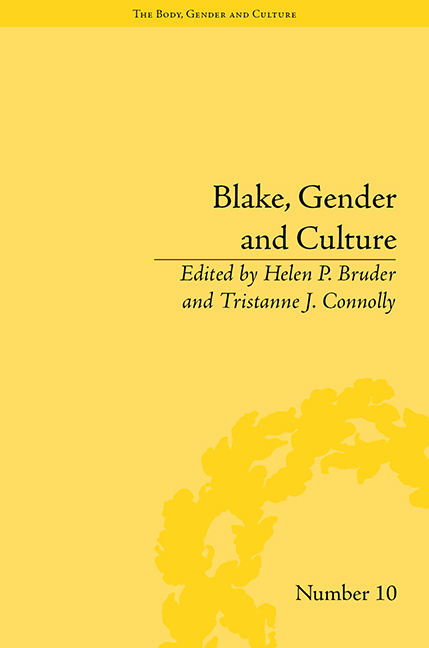Book contents
- Frontmatter
- CONTENTS
- Acknowledgements
- List of Contributors
- List of Figures
- Abbreviations
- Introduction: Naked History Displayed
- 1 ‘Merely a Superior Being’: Blake and the Creations of Eve
- 2 The Last Strumpet: Harlotry and Hermaphroditism in Blake's Rahab
- 3 Sex, Violence and the History of this World: Blake's Illustrations to the Book of Enoch
- 4 Bridal Mysticism and ‘Sifting Time’: The Lost Moravian History of Blake's Family
- 5 ‘A Secret Common to Our Blood’: The Visionary Erotic Heritage of Blake, Thomas Butts and Mary Butts
- 6 Changing the Sexual Garments: The Regeneration of Sexuality in Jerusalem
- 7 Philoprogenitive Blake
- 8 ‘Seeking Flowers to Comfort Her’: Queer Botany in Blake's Visions, Darwin's Loves and Wollstonecraft's Rights of Woman
- 9 ‘Or Wilt Thou Go Ask the Mole?’: (Con)Figuring the Feminine in Blake's Thel
- 10 Gendering the Margins of Gray: Blake, Classical Visual Culture and the Alternative Bodies of Ann Flaxman's Book
- 11 The Virgil Woodcuts Out of Scale: Blake's Gigantic, Masculine Pastoral
- 12 Closet Drama: Gender and Performance in Blake and Joanna Baillie
- Notes
- Works Cited
- Index
7 - Philoprogenitive Blake
- Frontmatter
- CONTENTS
- Acknowledgements
- List of Contributors
- List of Figures
- Abbreviations
- Introduction: Naked History Displayed
- 1 ‘Merely a Superior Being’: Blake and the Creations of Eve
- 2 The Last Strumpet: Harlotry and Hermaphroditism in Blake's Rahab
- 3 Sex, Violence and the History of this World: Blake's Illustrations to the Book of Enoch
- 4 Bridal Mysticism and ‘Sifting Time’: The Lost Moravian History of Blake's Family
- 5 ‘A Secret Common to Our Blood’: The Visionary Erotic Heritage of Blake, Thomas Butts and Mary Butts
- 6 Changing the Sexual Garments: The Regeneration of Sexuality in Jerusalem
- 7 Philoprogenitive Blake
- 8 ‘Seeking Flowers to Comfort Her’: Queer Botany in Blake's Visions, Darwin's Loves and Wollstonecraft's Rights of Woman
- 9 ‘Or Wilt Thou Go Ask the Mole?’: (Con)Figuring the Feminine in Blake's Thel
- 10 Gendering the Margins of Gray: Blake, Classical Visual Culture and the Alternative Bodies of Ann Flaxman's Book
- 11 The Virgil Woodcuts Out of Scale: Blake's Gigantic, Masculine Pastoral
- 12 Closet Drama: Gender and Performance in Blake and Joanna Baillie
- Notes
- Works Cited
- Index
Summary
Blake's prophetic texts frequently associate revolution and sexual liberation. In America (1793), the patriots’ rebellion issues in a moment of erotic apocalypse:
The doors of marriage are open, and the Priests in rustling scales
Rush into reptile coverts, hiding from the fires of Orc,
That play around the golden roofs in wreaths of fierce desire,
Leaving the females naked and glowing with the lusts of youth
For the female spirits of the dead pining in bonds of religion;
Run from their fetters reddening, & in long drawn arches sitting:
They feel the nerves of youth renew, and desires of ancient times,
Over their pale limbs as a vine when the tender grape appears (15:19–26, E57)
The retreat of the priests from Orc's fires parallels the reddening of the limbs and resurrection of ‘female spirits of the dead’. This eruption of female desire amid Orc's ‘red flames fierce’ melts the heavens, revealing Urizen's ‘leprous head / From out his holy shrine’ (16:1–4, E57). His attempt to dampen and obscure the ardour of revolution using his ‘tears in deluge piteous’, ‘stored snows’ and ‘clouds & cold mists’ (16:4, 9, 13, E57) continues a symbolic pattern present throughout Blake's oeuvre, in which the fires of desire contend with ice, stone and clouds. David Erdman links the opening ‘doors of marriage’ to the 1781 crisis in marriage law, whereby the wording of the Marriage Act of 1751 potentially made thirty years' of weddings illegitimate and thereby undermined the authority of the priests who had carried them out; he also points to Charles James Fox's attempts to liberalize marriage law in this year.
- Type
- Chapter
- Information
- Blake, Gender and Culture , pp. 99 - 110Publisher: Pickering & ChattoFirst published in: 2014



